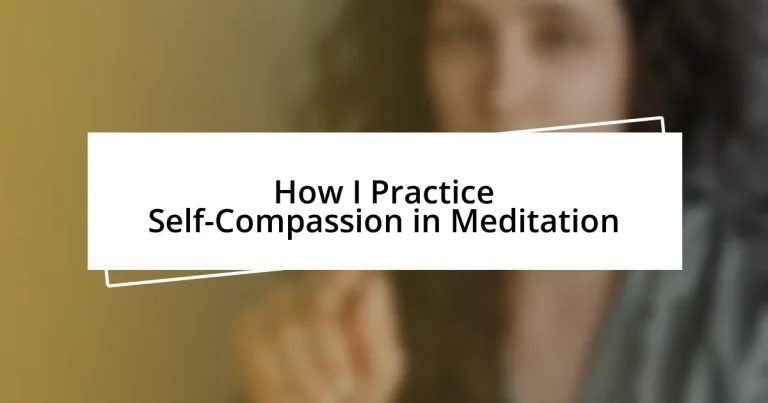Key takeaways:
- Practicing self-compassion in meditation leads to reduced stress, enhanced emotional resilience, and deeper self-awareness, fostering a kinder inner dialogue.
- Creating a comforting meditation space with personal touches and appropriate lighting encourages a sense of safety and nurtures the practice of self-compassion.
- Integrating self-compassion into daily life can be achieved through mindfulness, sharing experiences with others, and using affirmations to combat self-doubt and anxiety.
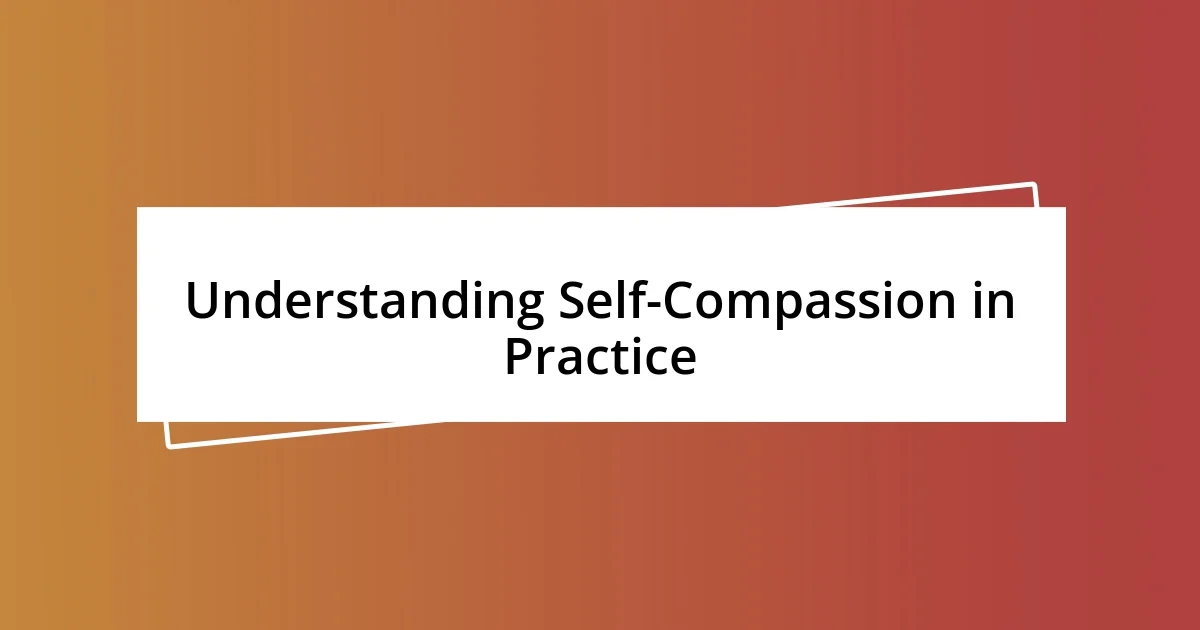
Understanding Self-Compassion in Practice
Self-compassion often feels elusive, especially when we’re battling internal criticism. I remember a moment during meditation when I caught myself spiraling into negative thoughts. Instead of pushing those feelings away, I chose to acknowledge them as part of my experience, asking myself, “What if I treated myself like a friend in this moment?” This shift was eye-opening for me.
Practicing self-compassion in meditation is about embracing vulnerability. I often find that when I sit with my thoughts, I can feel the weight of my struggles pulling me down. But when I gently remind myself that it’s okay to be imperfect—to be human—I notice a wave of relief wash over me. It’s a powerful reminder that we all share this struggle; it’s what unites us.
I’ve learned that incorporating kindness into my meditation practice not only calms my mind but also nurtures my spirit. Sometimes, I visualize wrapping myself in a warm blanket of understanding and acceptance. How does it feel when you allow yourself that space to just be? For me, it feels like a breath of fresh air, a moment of peace in an otherwise chaotic world.
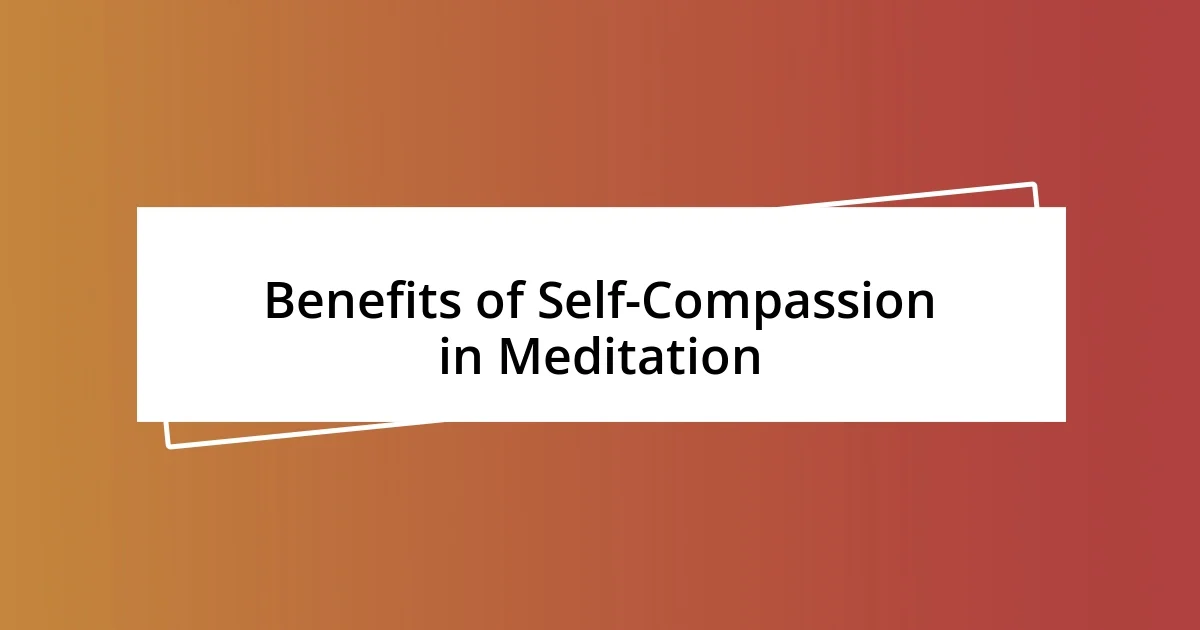
Benefits of Self-Compassion in Meditation
When I infuse self-compassion into my meditation sessions, I often notice a remarkable shift in my mindset. Suddenly, the harsh judgments that usually swirl around dissipate, creating space for acceptance and healing. This not only eases anxiety but fosters a much deeper connection with myself. I can truly say that self-compassion softens the edges of my inner dialogue; it’s as if I’m finally giving myself permission to rest without all the noise of self-doubt.
Here are some benefits I’ve experienced by practicing self-compassion in meditation:
- Reduced Stress: Embracing kindness toward myself lowers my stress levels significantly, making space for calmness.
- Enhanced Emotional Resilience: When I’m compassionate with myself, I bounce back from setbacks more quickly.
- Deeper Self-Awareness: Allowing myself to explore feelings without judgment helps me understand my emotional landscape better.
- Improved Concentration: I find it easier to stay present in the moment when I’m not critiquing myself.
- Stronger Sense of Connection: Self-compassion bridges the gap between my experiences and those of others, reminding me that we are all human.
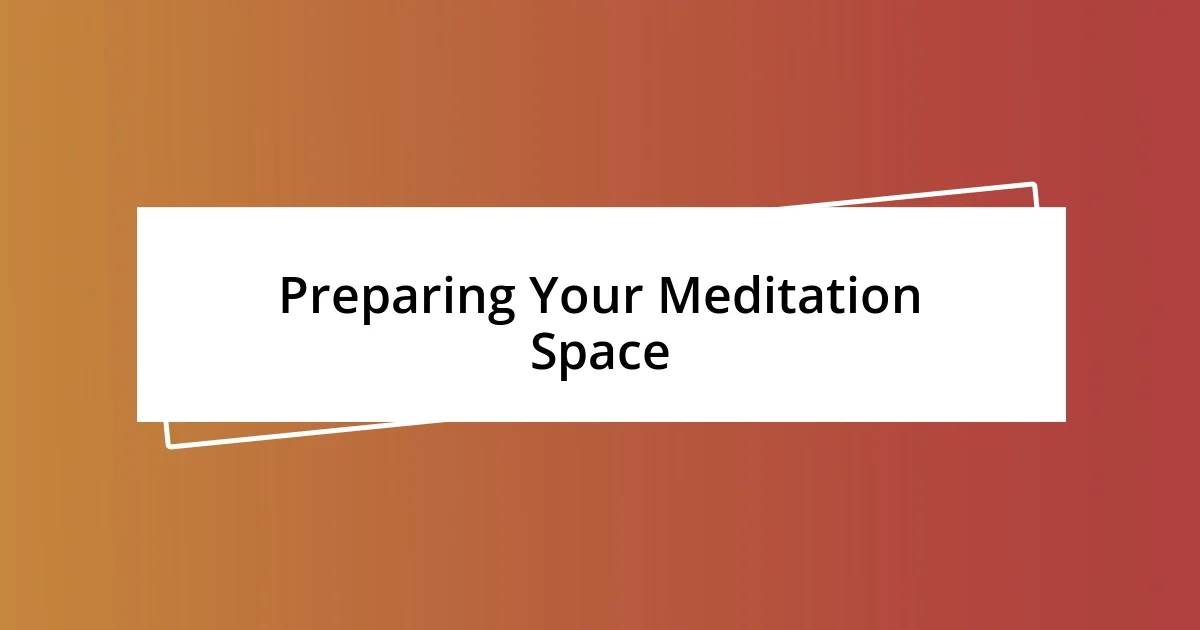
Preparing Your Meditation Space
When preparing your meditation space, it’s essential to create an environment that feels inviting and conducive to self-compassion. I often rearrange furniture or add cushions to make the area more comfortable. A cozy corner not only encourages a sense of safety but also invites a gentler approach to my practice.
Lighting plays a key role in setting the mood, too. I personally love using soft, warm lights or candles that create a soothing atmosphere. This subtle change transforms the space into a sanctuary where I can release the chaos of the day and settle into a more compassionate mindset.
Finally, consider incorporating personal items that resonate with you emotionally. For me, having a small plant or a photo of loved ones nearby acts as a visual reminder of support and love during my meditation. Every detail, no matter how small, contributes to a space that fosters nurturing thoughts, allowing me to embrace the practice of self-compassion fully.
| Aspect | Personal Touch |
|---|---|
| Comfort | Add cushions or blankets to relax and feel secure. |
| Lighting | Use soft lighting or candles for a warm, inviting atmosphere. |
| Personal Items | Incorporate images or objects that evoke feelings of love and support. |
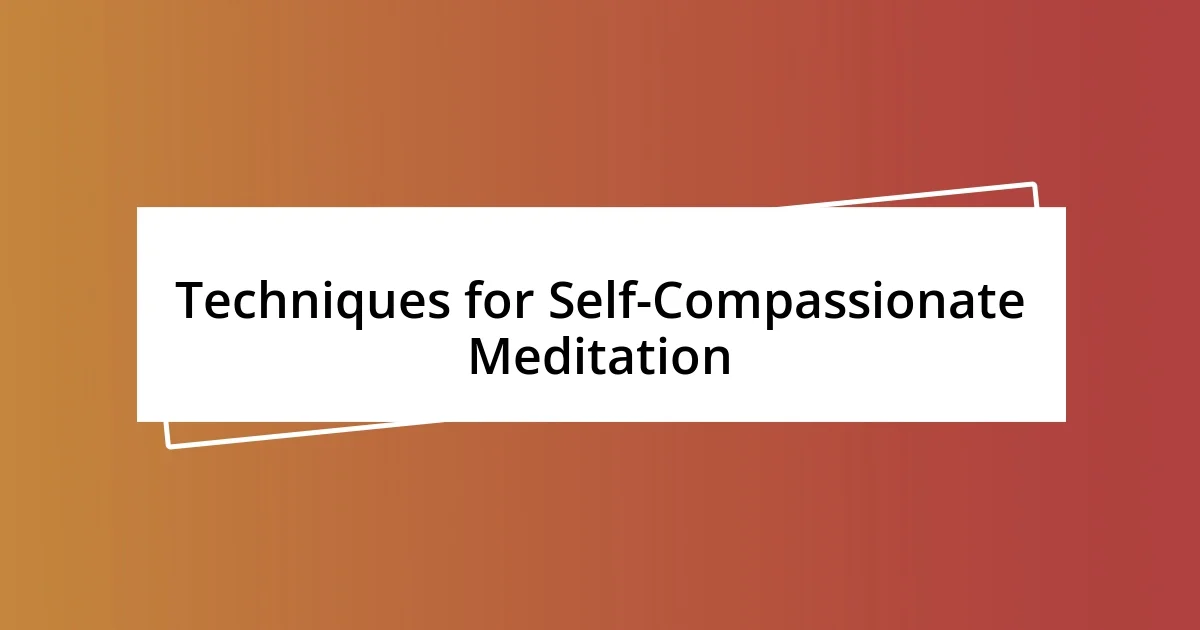
Techniques for Self-Compassionate Meditation
Employing specific techniques can truly enhance the experience of self-compassion in meditation. One of my favorites is the loving-kindness meditation, where I repeat phrases like “May I be happy, may I be healthy.” Each time I repeat these simple yet profound words, I can feel a warm glow swelling in my chest, reminding me to treat myself with the kindness I often extend to others. Have you ever noticed how a gentle affirmation can shift your entire perspective?
Another technique I find invaluable is body scan meditation. As I consciously move my awareness through different parts of my body, I invite a sense of acceptance and compassion towards any areas of tension or pain. This practice helps me recognize that I’m whole, despite any imperfections I might perceive. It creates a powerful dialogue where my body feels heard and valued. In moments like these, don’t you think it’s essential to embrace our human experience, just as it is?
Incorporating visualization into my meditation has been a game-changer as well. I often imagine a warm, radiant light enveloping me, reflecting all the love and compassion I deserve. This simple visualization serves as a reminder that I am worthy of kindness, especially from myself. I can’t help but wonder, what would it look like for you to step into a moment of pure self-acceptance?
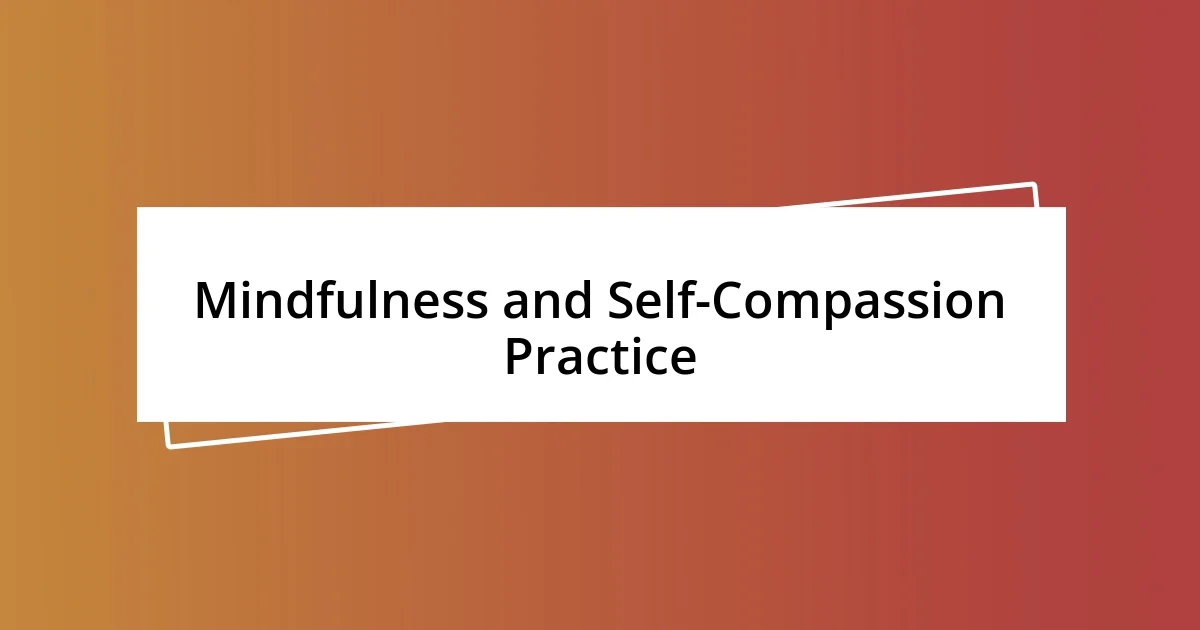
Mindfulness and Self-Compassion Practice
When I think about mindfulness and self-compassion, I realize they go hand in hand. Mindfulness allows me to observe my thoughts and feelings without judgment, fostering a space where I can be gentle with myself. I often find that simply sitting quietly and acknowledging my emotions without the need to change them opens a door to self-compassion; it’s like letting myself feel the rain without running for cover. Have you ever felt the power in just allowing yourself to sit with difficult feelings?
In my practice, I’ve discovered that focusing on my breath anchors me in the present moment. Each inhale and exhale helps me cultivate awareness of what I’m experiencing and allows an opening for self-kindness. I remember a time when I felt overwhelmed by self-doubt during a meditation session. Instead of pushing those thoughts away, I recognized them and gently reoriented my focus back to my breath. This simple act transformed my experience from one of frustration to one of acceptance.
Finding compassion for myself also means confronting my inner critic mindfully. During meditation, I sometimes visualize my critical thoughts as clouds passing through the sky. Instead of wrestling with them, I let them drift by, reminding myself that they’re not the entirety of who I am. When I do this, I often feel a lightness emerge within me, as if I’m shedding an old layer of negativity. What if you tried to view your inner critic this way? Wouldn’t it be freeing to let those critical thoughts float away rather than hold onto them?
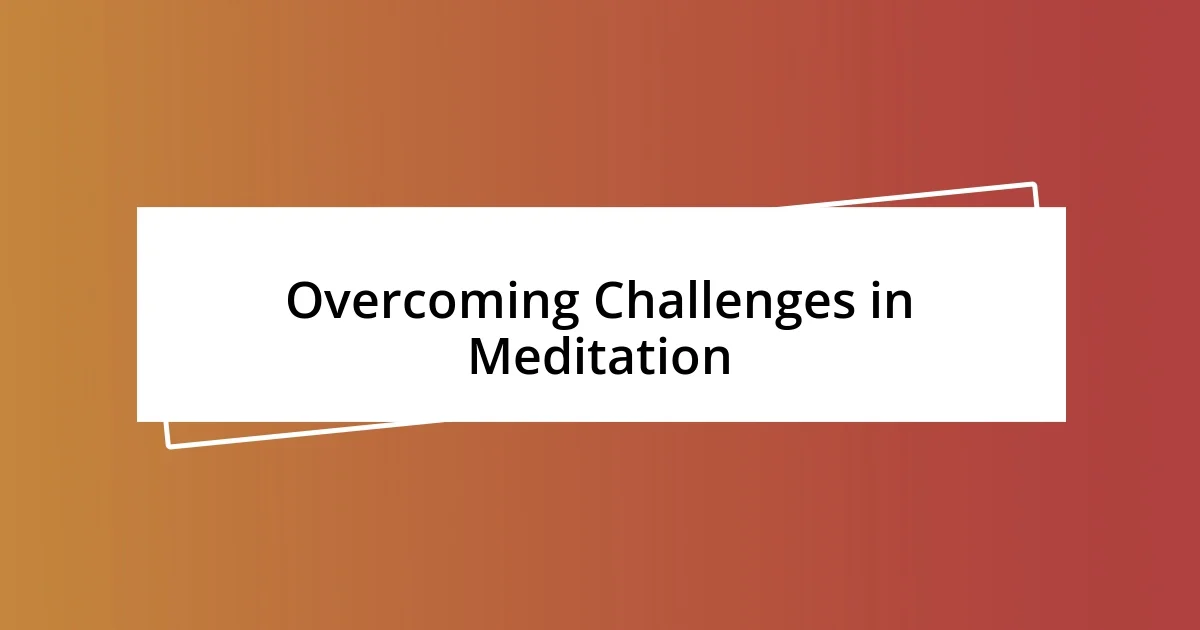
Overcoming Challenges in Meditation
Meditation can be a bumpy road, can’t it? I often find myself battling with distractions, whether it’s my ever-buzzing phone or racing thoughts about my to-do list. One day, while meditating, I felt overwhelmed by a flood of worries about work deadlines. Instead of fighting against them, I paused, took a deep breath, and noticed them without judgment. That small shift transformed my practice; instead of exhaustion, I embraced curiosity about these thoughts, which allowed me to return to my breath more smoothly.
Challenges don’t just vanish; they evolve into learning opportunities. I remember struggling with feelings of frustration during a particularly restless session. I’d sit there, tapping my fingers against my lap, longing for a calm state. One day, I simply allowed myself to acknowledge those feelings, thinking, “It’s okay to be unsettled.” Embracing that discomfort became a valuable lesson in resilience. Have you encountered a moment in your practice where acceptance carried you through?
Sometimes, I notice that my expectations for meditation can trip me up. I once harbored the misconception that a successful session meant achieving perfect stillness and tranquility. But through my journey, I’ve learned that the messiness of emotions and thoughts is part of the process. When I began welcoming those unpredictable moments, I found a deeper compassion within myself. Isn’t it liberating to let go of what we think meditation should look like and instead focus on what it feels like?
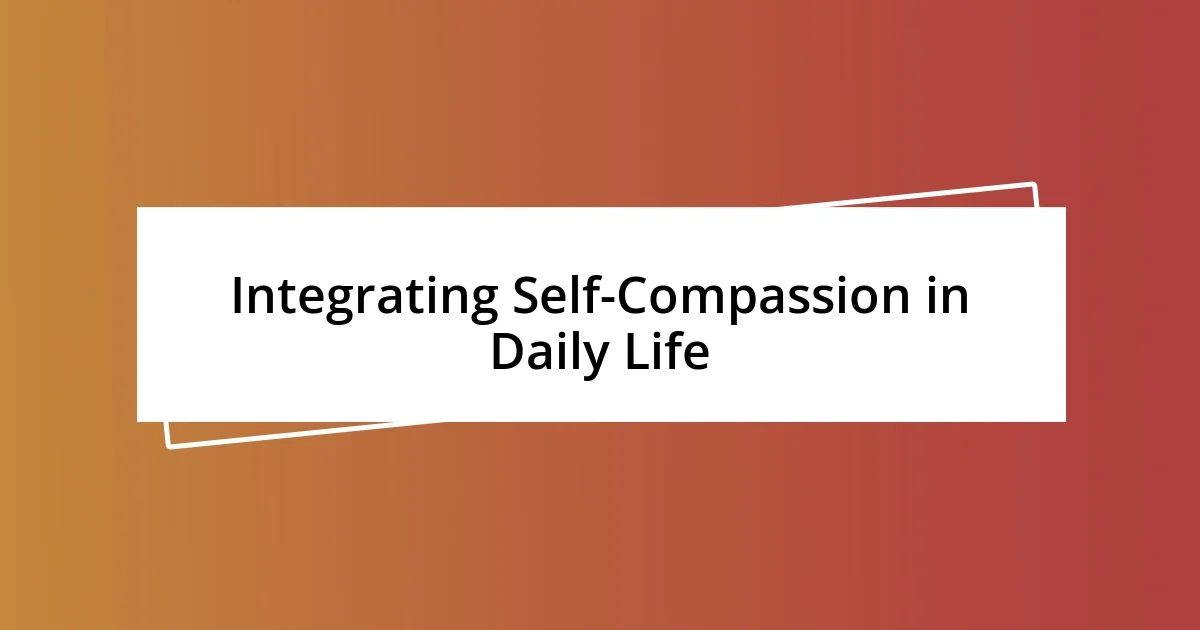
Integrating Self-Compassion in Daily Life
Integrating self-compassion into daily life requires consistent awareness. I like to use small, everyday moments as reminders. For instance, when I’m stuck in traffic, instead of simmering in frustration, I take a breath and remind myself that it’s okay to feel this way. It’s in these simple moments that I practice patience with myself, which cultivates a more compassionate mindset.
I also find that sharing my experiences with friends can reinforce this practice. One day, I had a heartfelt conversation with a close friend about our shared struggles with self-doubt. We explored how we often judge ourselves harshly, and in that moment, I felt a release—acknowledging our vulnerabilities brought a deeper sense of connection and compassion. Isn’t it enriching to realize that just by speaking openly, we can create an environment of mutual kindness and support?
In moments of stress, I sometimes repeat self-compassionate affirmations. When deadlines loom and anxiety creeps in, I remind myself, “It’s alright to feel overwhelmed; I’m doing my best.” This small act of kindness towards myself not only eases the tension but also helps me regain focus. Have you tried affirming your worth in times of difficulty? It’s a gentle yet powerful shift that fosters resilience in our daily lives.











